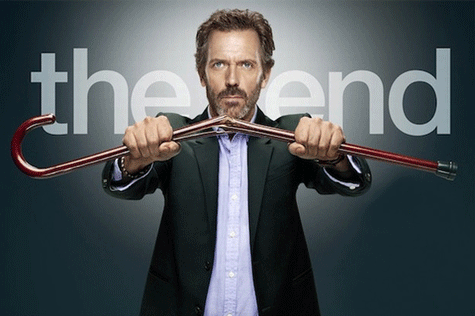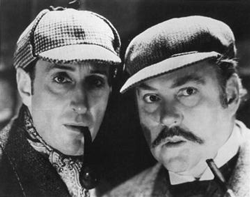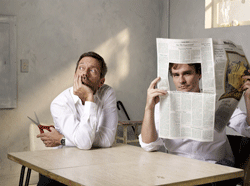
Well, that’s because I’m a Sherlockian, of course. But we’ll get to that. All in good time.
First, the basics: Sherlockians aren’t alone in having lauded this show. According to Wikipedia, it garnered “five Primetime Emmy Awards, two Golden Globe Awards, a Peabody Award, and nine People’s Choice Awards.” Not to mention its cast’s multiple Screen Actor’s Guild Awards, Satellite Awards, and Television Critics Association Awards. One might as well simply scream all the awards!!! and leave the subject closed. Its supporting cast, including but absolutely not limited to Lisa Edelstein, Jesse Spencer, Omar Epps, Jennifer Morrison, and Olivia Wilde, have delivered remarkable character arcs over the years. Its co-star Robert Sean Leonard (fine, there are episodes in which he says three words, but he’s half the dynamic duo) has proven one of the most apt, amusing, and ultimately moving straight men of any long-running series. And its star Hugh Laurie, despite the fact he imagined when auditioning for the role that House was surely too abrasive and barking mad to be a lead character on American network primetime, has delivered one bravura performance after another as the haunted American practitioner. This achievement is still more striking when one recalls that in reality he is a posh Brit who went to Hogwarts (technically the Dragon School, followed by Eton and Cambridge).
As a former actor, a word on Laurie’s acting skills before we dive into the Sherlockian geekfest: it is very, very difficult to feign intelligence levels other than one’s own. The eyes tend to give one away. If one’s inner monologue consists exclusively of rainbows and an affinity for Cheddar cheese, it’s a hard wrench to play a neurosurgeon/concert-violinist/string-theory-proponent effectively.
If, on the other hand, one is Hugh Laurie, and one is an actor/pianist/novelist/guitarist/composer/best-friend-of-Stephen-Fry, then it’s quite the hat trick to play a dunce. And yet play dunces Laurie did, repeatedly—on A Bit of Fry and Laurie, Jeeves and Wooster, and Blackadder to name three masterpieces of comedic soufflé-baking. A flawless American accent is hard. Conveying various speeds of thought process is harder. And Laurie’s Dr. House thought with such acuity that Sherlock Holmes himself would have slapped him on the back and called him brother.
Yep, we got there.

Proving that House MD is based on the Sherlock Holmes mysteries isn’t necessary due to the fact that producer David Shore has openly stated so, but since I’m going to yearn for the show tragically, let’s compile a brief list of the evidence anyhow.
Dr. House lives at 221, apartment B, the street address and the apartment number separately posted (of course they are) in a stroke of canonical authenticity achieved by neither BBC’s Sherlock nor Warner Brothers’s Sherlock Holmes, both of which proudly and erroneously display “221B” on the front door.
House is a cranky genius with a fondness for substance abuse, who refuses any cases he considers dull and solves the impossible ones with a combination of observation and close reasoning. Sound familiar? He abhors sentiment, plays an instrument, and owns various Sherlockian books shown throughout the series. He is shot by a man named Moriarty in season two, and his inaugural “adventure” in the pilot episode is to do with a woman named Adler.

That’s it, really. Supposing these elements are in place, we will watch Shetland Downs, Independent Consulting Show Pony as portrayed by marionettes and make you millions in advertising revenue.
House MD achieved all our criteria with flying colors, and for this reason the closing episodes, as I mentioned, create a sensation in our breasts akin to being pierced with cayenne pepper-tipped pitchforks. Since the show is but recently culminated, I’ll forgo any potential spoilers here (other than saying that Robert Sean Leonard deserves the first Nobel Prize awarded to a TV performance, and possibly a flying car). We needn’t go into detail. This is a thank-you for all eight years of splendid entertainment, to the writers and directors and producers and crew and cast, and I want everyone to join the party. But if you haven’t seen episode 177, “Everybody Dies,” and if you’ve never read “The Adventure of the Final Problem” by Sir Arthur Conan Doyle, fix it. This article will still be here should you choose to return.
The role of Sherlock Holmes, be he named Sherlock or something sounding less like its etymology originated on the planet Krypton, famously calls to actors who own something of a dark side. Jeremy Brett, the quintessential 1990s version, suffered terribly from manic depressive disorder. Robert Downey, Jr., possibly the most charming man alive, struggled for years to overcome drug addiction. Of course, naturally dark roles will require performers who can effectively access darkness, and this phenomenon is by no means a rule—Benedict Cumberbatch, while a masterful chameleon, seems shockingly well-adjusted. But I find it resonant that Hugh Laurie has been treated continually for severe depression. In a statement that uncannily echoes the black ennui of the Victorian master sleuth, Laurie admitted to being “bored” during a demolition derby, telling James Lipton that “Boredom is not an appropriate response to exploding cars.”
I heartily wish Laurie all the best in future—presumably spending more time with his family in the UK, reportedly beginning a new project with his partner in comedy Stephen Fry—but many unforgettable performances are born out of fathomless sadness, a wish to inhabit another skin, and I’m grateful to him for having brought us such a complex, engrossing version of our personal hero. Playing Gregory House probably wasn’t comfortable and it certainly was never easy. But the work Laurie did as the star of House MD was remarkable. And it won’t be soon forgotten.
Lyndsay Faye is the author of Dust and Shadow and The Gods of Gotham. She tweets @LyndsayFaye.
Read all Lyndsay Faye’s posts on Criminal Element.

I, too, watched EVERY episode of House….most more than once. I miss it so already, thanks for the post confirming the Holmes/Watson vibe!!! Hugh Laurie is soooo brilliant, and the “Swan Song” was absolutely awesome!!!
The last episode of House, Gregory House’s solution to the story’s main conflict was clearly inspired by Doyle’s “The Final Problem” and “The Empty House”. People need to read both to get it. I’ll say no more, in case someone hasn’t seen it yet, but that made me smile from ear to ear. Very much on point. A great and appropriate finale.
What an amazing article, I am now sitting again with tears in my eyes, oh God, how I will miss this show… Hugh Laurie and RSL deserve all the awards.
I will really miss this show. I return to it time and again. House is one of the top 2 TV characters ever created in my book, along with Alan Shore from Boston Legal.